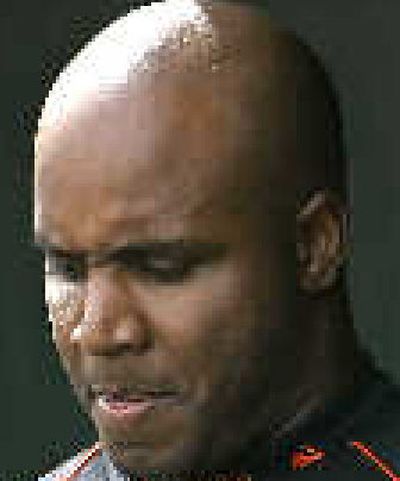Bonds friend now foe

NEW YORK – For years, Barry Bonds has waged war against his own game-used jerseys, autographed bats and other collectibles, claiming dealers and collectors acquired hundreds of pieces that were forged, stolen or sold without his consent. Memorabilia insiders say they didn’t understand why the slugger seemed so bent on deliberately roiling what was a very profitable market.
But as a federal grand jury moves closer to a possible indictment of Bonds on perjury and/or tax-evasion charges, collectors and dealers say the reason behind the campaign has become clear: Bonds was trying to hide income and discredit Steve Hoskins, the boyhood friend and memorabilia partner who has emerged as a key figure in the Justice Department’s case against the slugger.
“I think he was trying to hide something from the IRS,” said collector Jeff Kranz, who said he bought $250,000 worth of Bonds’ memorabilia between 1988 and 2000.
Hoskins’ attorney Michael Cardoza told the New York Daily News that Hoskins and Bonds teamed up to sell Bonds lithographs and memorabilia after the outfielder signed with the Giants and returned to the Bay Area, where he grew up, in 1993.
A few years ago, Bonds confided to Hoskins that he was using steroids, Cardoza said. He also asked Hoskins to deliver cash that came from memorabilia deals to Bonds’ girlfriends so his ex-wife, current wife and accountant didn’t find out about his illicit relationships, according to Cardoza.
“My guy kept meticulous records of those transactions,” Cardoza said. “We have presented evidence about those transactions to the feds.”
Cardoza said Hoskins repeatedly tried during the years to convince Bonds to stop using performance-enhancing drugs. By 2003, according to Cardoza, Hoskins grew tired of his relationship with Bonds after the ballplayer started acting irrationally, mood swings Cardoza attributes to steroid use.
Cardoza said Bonds was angry that his longtime friend had walked away from their relationship and in retaliation told Justice Department officials in 2003 that Hoskins had forged his autograph and sold stolen memorabilia. The FBI investigated the claims – 14 pieces Kranz had bought from Hoskins were seized as evidence and held for more than two years – before the case was finally closed.
Bonds, however, was unaware that the government had already begun investigating his alleged steroid use. Bonds’ attorneys, Michael Rains and Laura Enos, did not return calls to the Daily News. Earlier this week, however, they told The New York Times that Hoskins threatened to ruin Bonds with steroid allegations after Bonds confronted him about the forgeries and thefts. Prosecutors agreed to drop the memorabilia investigation, Rains said, if Hoskins would cooperate in the steroid probe.
“Barry Bonds’ attorney says Steve is a snitch, but he is just speculating,” Cardoza said. “We cut no deal with the feds.”
Several memorabilia insiders interviewed by the Daily News said they tend to believe Hoskins’ version of the story.
Kranz described Bonds in disparaging terms and called him a liar.
“I don’t know what went on between them, but everybody knew Steve was the guy to see for Bonds memorabilia,” Kranz said. “Everybody knew they were very close. And all of a sudden Barry is saying Steve had no authorization to sell his stuff?”
Kranz is planning to sell much of his Bonds’ collection next month at Lelands, the Long Island auction house, even though prices for Bonds merchandise have plummeted recently. “I’m just sick of it. I want to get out,” Kranz said.
Kranz says he could have sold the jersey Bonds wore on Opening Day at the Giants’ new ballpark in 2000 for as much as $40,000. Now he believes it will fetch $25,000. He expects to get $8,000 for a glove from the 1987 season that he said would have been worth $15,000 a few years ago.
•The Associated Press reports the fan who caught Barry Bonds’ 715th home run ball while waiting for a beer and peanuts will sell the history-making ball on Internet auction site eBay.
Andrew Morbitzer said he and his wife, Megan, mulled keeping the ball, but decided they couldn’t turn down a possible payoff. The ball might help the couple put a downpayment on a home in pricey San Francisco.
Experts have said the ball is expected to fetch around $100,000 at auction, far less than the $500,000 some experts say it could have commanded absent the controversy surrounding Bonds and his alleged involvement with steroids.
The auction will start July 24 and last 10 days. Morbitzer is mulling an opening bid of roughly $10,000. The auction will also likely be a “reserve” auction, meaning Morbitzer won’t part with the ball for less than a certain price.